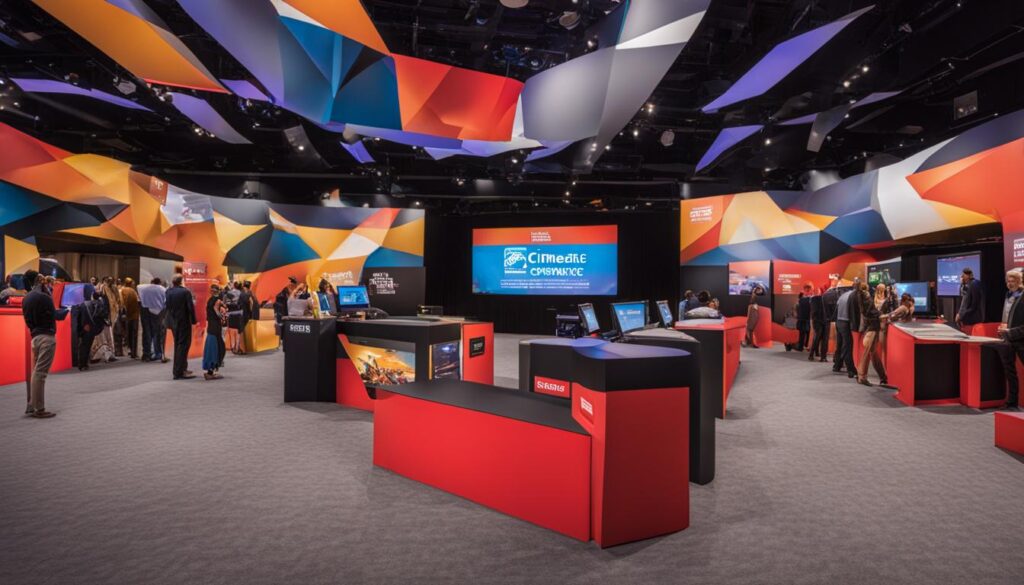We may earn money or products from the companies mentioned in this post.
Event marketing is a critical component of a successful business strategy. It involves the use of events to promote a product or service, build brand awareness, and engage with target audiences. With the right event marketing strategies, businesses can drive better ROI and create more meaningful connections with customers.
In this article, we will explore the various event marketing strategies that businesses can implement to maximize their success in the U.S. market. We will cover everything from event promotion, planning, and management to event advertising, experiential marketing, event branding, and event sponsorship.
By the end of this article, you will have a comprehensive understanding of how to develop and implement an effective event marketing strategy that will help your business achieve its marketing goals.
Key Takeaways
- Event marketing is an essential part of a successful business strategy.
- The right event marketing strategies can help businesses drive better ROI and create more meaningful connections with customers.
- Event promotion, planning, and management are critical components of event marketing.
- Effective event advertising and experiential marketing can help businesses create memorable brand experiences.
- Event branding is crucial in capturing and retaining audience attention.
Understanding Event Marketing and Its Benefits
Event marketing is a strategy that involves using live experiences to promote a brand, product, or service. It involves event promotion, planning, and management to create engaging experiences that drive business success.
Benefits of Event Marketing
Event marketing has numerous benefits that can positively impact a business’s bottom line. Firstly, events provide an excellent opportunity to engage with potential customers in a memorable way, leading to improved brand awareness and recall. Additionally, events create a sense of community, fostering brand loyalty and advocacy among attendees.
“Events create a sense of community, fostering brand loyalty and advocacy among attendees.”
Furthermore, events provide a platform for businesses to showcase products, services, or the brand itself, in an environment where they can be experienced first-hand. This can lead to increased sales, customer retention, and even generate media coverage, further boosting brand exposure.
Event Planning
Effective event marketing requires thorough planning, from setting objectives to defining target audiences, selecting the right venue, and developing engaging content. Event planning involves several stages, from identifying the type of event that aligns with business objectives to setting a budget, selecting vendors, and managing logistics.
Event planning should begin with a clear understanding of the business objectives so that every stage of the process aligns with those goals. This will help ensure that the event delivers the desired results, whether it is to generate leads, build brand awareness, or strengthen customer relationships.
Event Promotion
Event promotion is essential to attract attendees and generate buzz around the event. Promotion should begin well in advance, using a mix of digital and traditional marketing tactics to reach the target audience. An effective promotion strategy can help increase attendance, generate leads, and maximize ROI.
Event promotion can include email marketing, social media campaigns, advertising, PR, and even influencer marketing. The key is to create a comprehensive strategy that maximizes reach and engagement with the target audience.
Event Management
Event management involves the logistics and execution of the event, from managing vendors and staff to ensuring attendees have an enjoyable and memorable experience. Effective event management can help ensure that everything runs smoothly, from registration to post-event follow-up.
Ensuring that attendees have an enjoyable experience is vital to the success of the event. This can include offering engaging content, providing plenty of opportunities for networking, and creating a welcoming and inclusive environment.
| Event management checklist: | |
|---|---|
| Set clear event goals and objectives | |
| Define the target audience | |
| Develop a budget | |
| Choose a venue | |
| Source and manage vendors | |
| Create engaging content | |
| Ensure smooth logistics and execution | |
| Provide excellent customer service |
Overall, understanding the importance of event marketing and how to effectively plan, promote, and manage events can help businesses maximize ROI, generate leads, and build brand awareness and loyalty.
Implementing Effective Event Advertising and Experiential Marketing
Event advertising is a crucial aspect of event marketing that should not be overlooked. It involves promoting an event to attract and encourage potential attendees to participate in it. Effective event advertising can help create awareness, generate interest, and drive attendance.
Experiential marketing is another strategy that can be used to create memorable brand experiences for attendees. It involves using interactive and engaging activities that provide a firsthand experience of the brand’s products or services. This approach can help increase engagement, enhance brand loyalty, and drive sales.
Event branding is also a key component of successful event advertising and experiential marketing. It involves creating a consistent and cohesive brand identity across all event materials and communications. This can help create a strong brand impression, increase brand recognition, and reinforce brand messaging.
“Effective event advertising and experiential marketing can help businesses create a memorable brand experience that leads to increased engagement and brand loyalty.”
Leveraging Event Sponsorship for Maximum Impact
Event sponsorship is a vital part of any successful event strategy, providing businesses with the opportunity to increase brand awareness and reach a wider audience. While it can be expensive, the potential return on investment makes it a worthwhile expense when executed properly.
“Sponsorship can be a critical differentiator in a crowded market. It can help companies break through the clutter, build awareness and drive sales through increased brand exposure.” – Forbes
When considering event sponsorship, it’s important to identify events that align with your brand values and target audience. This ensures your sponsorship is relevant and resonates with attendees, leading to increased engagement and positive brand perception.
Beyond selecting the right event, it’s also crucial to negotiate a beneficial sponsorship package. This can include various forms of promotion such as logo placement, product showcases, and speaking opportunities. The key is to ensure the package provides enough visibility and value to justify the investment.
Examples of Successful Event Sponsorship
| Company | Event | Sponsorship Package |
|---|---|---|
| Nike | Olympic Games | Official apparel and footwear sponsor |
| Red Bull | Air Race World Championship | Title sponsor, branded planes and banners |
| American Express | US Open Tennis Championships | Official card, on-site activations, and exclusive lounges |
As demonstrated by the above examples, successful event sponsorship requires thoughtful selection and strategic negotiation. By leveraging partnerships in this way, businesses can maximize their impact on brand awareness and audience engagement.
Tips for Developing a Successful Event Strategy
Developing a successful event strategy requires careful planning and management to ensure everything runs smoothly on the day. Here are some tips to help you create an event that achieves your objectives:
1. Set Clear Goals
Determine your event’s objectives and what you aim to achieve. This could be anything from increasing brand awareness, driving sales, or engaging with customers. Once you have identified your goals, you can design an event strategy that aligns with these objectives.
2. Identify Your Target Audience
Identify who you want to attend your event and tailor your event experience to their needs. Consider factors such as age, interests, and location to create an event that resonates with your target audience.
3. Plan Your Budget
Allocate sufficient funds to deliver your event vision. Consider all costs, including venue hire, catering, and marketing, to avoid any unexpected expenses that could impact the success of your event.
4. Create Detailed Logistics Plan
Planning the logistics of your event is crucial to its success. Create a detailed schedule that outlines the timeline of the day, including when speakers are due to take the stage, when breaks will occur, and how the event will conclude. Ensure that all staff members are aware of their responsibilities and are adequately trained to handle any issues that may arise.
5. Consider Event Promotion
Use various marketing channels to promote your event, such as social media, email, and targeted advertising. Ensure that you create an event page that provides all the necessary details and allows attendees to register their attendance easily.
6. Leverage Technology for Event Management
Use technology such as event management software to streamline the planning process and manage the event’s logistics. This will help you ensure that everything is on track, and you can manage any issues that arise on the day.
By following these tips, you can create an event that delivers your objectives and helps you achieve your goals. Remember that event planning is an ongoing process, and you should always look for ways to improve and refine your approach.
Conclusion
Effective event marketing strategies can have a tremendous impact on the success of a business in the U.S. market. By implementing event promotion, planning, and management techniques, businesses can drive brand engagement and improve ROI. Additionally, leveraging event advertising, experiential marketing, and event branding can create memorable experiences for audiences.
Event sponsorship is also a significant aspect of an overall event marketing strategy. By identifying strategic partnerships, businesses can maximize brand exposure and reach a wider audience. However, to develop a successful event strategy, goal setting, target audience identification, budgeting, and logistics must be considered.
In conclusion, businesses must prioritize an effective event marketing strategy to achieve success in the U.S. market. By implementing the discussed techniques, businesses can drive brand engagement and improve ROI. Event marketing, event promotion, event planning, event management, event advertising, experiential marketing, event branding, event sponsorship, and event strategy all play a crucial role in achieving this success.
FAQ
What is event marketing?
Event marketing refers to the strategic promotion and management of events to drive business success. It involves planning and executing events that engage target audiences, increase brand visibility, and generate positive ROI.
Why is event marketing important?
Event marketing is important because it allows businesses to connect with their target audience on a more personal level. It creates opportunities for face-to-face interactions, builds brand loyalty, and provides a platform for showcasing products or services.
What are the benefits of event promotion?
Event promotion helps increase awareness and attendance for an event. By effectively marketing the event through various channels such as social media, email marketing, and traditional advertising, businesses can attract a larger audience and maximize their event’s success.
How does event planning contribute to marketing success?
Efficient event planning ensures that all logistical aspects are well-organized, leading to a seamless event experience for attendees. This contributes to positive brand perception and enhances the overall effectiveness of marketing initiatives.
What is experiential marketing and how does it relate to event marketing?
Experiential marketing focuses on creating immersive brand experiences that leave a lasting impact on consumers. It often involves interactive elements and sensory engagement. Events provide a perfect opportunity to implement experiential marketing strategies and connect with audiences in a meaningful way.
How does event branding play a role in successful event marketing?
Event branding involves creating a cohesive visual identity and messaging that aligns with the event’s purpose and target audience. Strong event branding helps attract attention, establish a unique identity, and leave a memorable impression on attendees, increasing the overall effectiveness of marketing efforts.
Why is event sponsorship important for event marketing?
Event sponsorship allows businesses to align themselves with relevant events and reach a wider audience through shared marketing efforts. By strategically choosing event sponsorships, businesses can maximize brand exposure, generate leads, and strengthen their industry presence.
What are some tips for developing a successful event strategy?
Some tips for developing a successful event strategy include setting clear goals, understanding the target audience, creating a budget, selecting the right venue, collaborating with partners, promoting the event effectively, and conducting thorough post-event evaluations.
Affiliate Disclosure: This post may contain affiliate links. If you purchase through our link, we may receive a small commission, but at no additional cost to you. For more information, please see our Disclosure statement.



